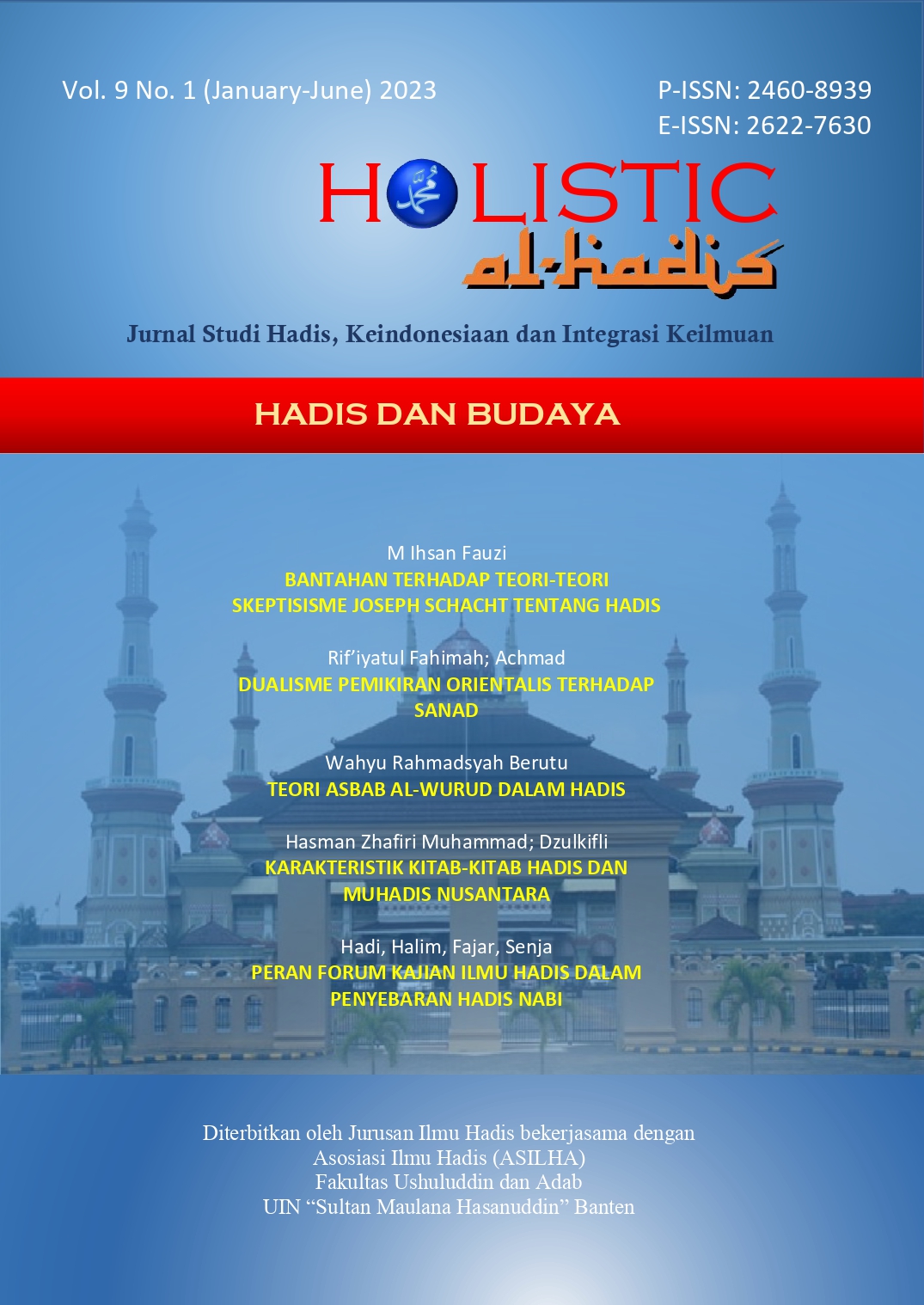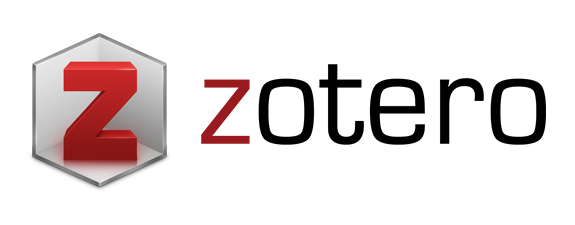KARAKTERISTIK KITAB – KITAB HADIS DAN MUHADIS NUSANTARA
DOI:
https://doi.org/10.32678/holistic.v9i1.6517Keywords:
Books of Hadith, Nusantara Ulama, Islamic Boarding SchoolAbstract
The development of hadith books in the archipelago is full of the services of scholars in the archipelago who received education in the Middle East, such as Sheikh Nawawi al-Bantani and Sheikh Mahfudz al-Tarmasi. This study aims to examine the science related to the two ulama figures and their efforts in the civilization of the scientific treasures of hadith in the archipelago. This study uses a library study where the sources extracted are scientific literature in the form of journal articles and books. From the results of this study it was found that Sheikh Nawawai al-Bantani and Sheikh Mahfudz al-Tarmasi were Nusantara people who both studied in the Middle East and contributed to the civilization of the development of hadith books in the archipelago. And both of them are among other scholars who have laid the scientific foundations in Islamic boarding schools throughout Indonesia to this day, because their works are still being used and studied.
Keywords: Books of Hadith, Nusantara Ulama, Islamic Boarding School
ABSTRAK
Perkembangan kitab – kitab hadis di Nusantara sarat dengan jasa para ulama – ulama di Nusantara yang mengenyam pendidikan di Negeri Timur Tengah, diantaranya seperti Syekh Nawawi al – Bantani dan Syekh Mahfudz al – Tarmasi. Penelitian ini bertujuan untuk mengkaji terkait dengan keilmuwan dua tokoh ulama tersebut dan usaha – usahanya dalam peradaban khasanah keilmuwan hadis di Nusantara. Penelitian ini meggunakan studi Pustaka dimana sumber yang digali ialah literatur – literatur ilmiah berupa artikel jurnal dan buku. Dari hasil penelitian ini ditemukan bahwa Syekh Nawawai al – Bantani dan Syekh Mahfudz al – Tarmasi ialah orang Nusantara yang sama – sama menimba ilmu di Timur Tengah dan memberikan kontribusi dalam peradaban pengembangan kitab – kitab hadis di Nusantara. Serta beliau berdua merupakan diantara para ulama – ulama lainnya yang meletakkan dasar keilmuwan di pesantren – pesantren seluruh Indonesia hingga saat ini, sebab karya – karyanya masih terus digunakan dan dikaji.
Kata Kunci : Kitab – kitab Hadis, Ulama Nusantara, Pesantren
Downloads
References
A. Malik Madani. “Posisi Kitab Kuning Dalam Khasanah Keilmuan.” P3M VII, no. 1 (1989).
Abd. Rahman Mas’ud. “Nawawi Al - Bantani : An Intelektual Master Of The Pesantren Tradition.” IAIN Syarif Hidayatullah 3, no. 3 (1996): 108.
Affandi Muchtar. “Mulahadah ‘Ammah An Al - Kutub Al - Sfra’ Fi Al-Ma’ahid Al-Diniyyah.” Studia Islamika 3, no. 2 (1996).
Ali Muqoddas. “Syeikh Nawawi Al - Bantani Al - Jawi Ilmuan Spesialis Ahli Syarah Kitab Kuning.” Jurnal Tarbawi 11, no. 1 (2014): 1–19.
Burhanuddin, Mamat S, and Saifuddin Zuhri Qudsy. “Kajian Kontemporer Terhadap Karya Nawai Al - Bnatani.” Dinika 4, no. 1 (2019): 84–102. https://doi.org/10.22515/dinika.v4i1.2061.
Hasan Su’ud. “Jaringan Ulama Hadis Indonesia.” Jurnal Penelitian STAIN Pekalongan 5, no. 2 (2008): 2008.
Irkhamiyati. “Evaluasi Persiapan Perpustakaan Stikes ’ Aisyiyah Yogyakarta.” Berkala Ilmu Perpustakaan Dan Informasi 13, no. 1 (2017): 37–46.
L.J. Moleong. “Metode Penelitian Kualitatif, Bandung : PT. Remaja Rosdakarya.,” 1993.
Mahdy. “Metodologi Syarah Hadis Nabi SAW (Telaah Kitab Tanqih AlQaul Al - Hasis Fi Syarh Lubab Al - Hadis Karya Imam Nawawi Al - Bantani).” Diploma, no. July (2020): 2020.
Martin Van Bruinessen. “Pesantren Dan Kitab Kuning Pemeliharaan Dan Kesinambungan Tradisi Pesantren.” Jurnal Ulumul Qur’an III, no. 4 (1992): 82–83.
Mas’ud, Abd. Rahman. “Pemikiran Syekh Nawawi Al - Bantani.” P3M VI, no. 1 (1989): 102.
Mohammad Solek. “Studi Tentang Kitab Nihayat Al - Zaun : Upaya Memahami Pemikiran Hukum Islam Imam Nawai Al - Bantani Dengan Analisa Intertekstual.” Jurnal Walisongo 15 (2000): 46.
Muhajirin, Muhammad. “At - Tarmasi : Icon Baru Hadits Arba’in Di Indonesia.” ASILHA International Conference, 2017, 13.
Muhammad Mahfudz al - Tarmasi. “Al - Khil’ah Al - Fikriyyah Bi Syarkh Al - Minhahal - Khairiyyah.” Al - Barokah PP. BUQ Betengan, 2008, 1.
Muhammad Mahfudz al -Tarmasi. “’Inayah Al - Muftaqir Bima Yata’allaq Bi Sayyidina Al - Khadhir.” Al - Barokah PP. BUQ Betengan, 2007, 1.
Muhammad Mahfuz al - Tarmasi. “Kifayah Al - Mustafid Lima’ Alamin Asanid.” Dar Al - Basyair, n.d., 41.
Muhammad Muhajirin. “Mahfudz Al - Tarmasi : Ulama Hadis Nusantara.” Idea Press, 2016, 25.
Muhammad, Nurdinah. “Karakteristik Jaringan Ulama Nusantara Menurut Pemikiran Azyumardi Azra.” Jurnal Subtantia 14, no. 128 (2012): 73–87.
Nurzakka, Muhammad. “Study of Tanqih Al - Qaul Al - Hatsits : The Book Of Sheikh Nawawi Al Bantani.” Jurnal Living Hadis VI, no. 1 (2021): 21–48.
Rulam Ahmadi. “Metodologi Penelitian Kualitatif, Yogyakarat : Ar - Ruzz Media,” 2016.
Sugiyono. “Metode Penelitian Kombinasi,” 2018.
———. “Metode Penelitian Kuantitatif, Kualitatif, Dan R&D Ed.” (Bandung : CV Alfabeta, 2016), n.d., 219.
Sutarto. “Kumpulan 40 Hadis Syekh Mahfudz Al - Tarmasi.” Lingkar Media, 2014, 1.
Downloads
Published
Issue
Section
License
Copyright (c) 2023 Hasman Zhafiri Muhammad, Dzulkifli

This work is licensed under a Creative Commons Attribution 4.0 International License.
Authors who publish with this journal agree to the following terms:
-
Authors retain copyright and grant the journal right of first publication with the work simultaneously licensed under a Creative Commons Attribution License that allows others to share the work with an acknowledgement of the work's authorship and initial publication in this journal.
-
Authors are able to enter into separate, additional contractual arrangements for the non-exclusive distribution of the journal's published version of the work (e.g., post it to an institutional repository or publish it in a book), with an acknowledgement of its initial publication in this journal.
-
Authors are permitted and encouraged to post their work online (e.g., in institutional repositories or on their website) prior to and during the submission process, as it can lead to productive exchanges, as well as earlier and greater citation of published work (See The Effect of Open Access).


















